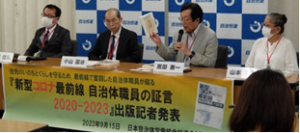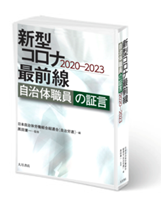Jichiroren publishes real voices of protectors of residents’ lives and livelihoods
Jichiroren publishes real voices of protectors of residents’ lives and livelihoods
News conference for releasing Covid-19 Frontline: Municipal Workers’ Testimonies 2020-2023
 Jichiroren on September 15 announced the publication of Covid-19 Frontline: Municipal Workers’ Testimonies 2020-2023 at a news conference at the Health, Labour and Welfare Ministry.
Jichiroren on September 15 announced the publication of Covid-19 Frontline: Municipal Workers’ Testimonies 2020-2023 at a news conference at the Health, Labour and Welfare Ministry.
The news conference was attended by Kenichi Kuroda, professor emeritus at Meiji University who supervised the compilation of the book, and three Jichiroren representatives: Vice President Kuniharu Koyama, Deputy Secretary General Yoshihiro Yoshida, and a Central Executive Committee member Tamiko Yamamoto who is a public health nurse and a co-author of the book.
“The book describes how municipal workers have struggled over the last three and a half years of the Covid-19 pandemic to protect residents’ lives and livelihoods while battling with their own infections,” spoke Vice President Koyama. “From public health, healthcare, medical care, welfare to public administration, (battels against Covit-19 pandemic in) all areas of local government are covered by 41 authors from across Japan. This work is a milestone in the history of Japan and it was made possible by Jichiroren, a federation of labor unions in municipalities throughout the country.”
Kuroda (photo above: second from right) mentioned that this is a second work on a collection of ‘municipal workers’ testimonies’, following Iwate on March 11: Testimonies and Records of Municipal Workers Jichiroren published 10 years ago. “Local governments’ responses to the Covid-19 clearly show that under their policies emphasizing efficiency and cost cutting, the great number of their workers has been reduced and their functions have been consolidated.” Kuroda added, “This book was a successful outcome of three parties’ collaborative efforts: municipal workers who fought on the front line, researchers who made analysis and policy proposals, and labor unions. We hope that many citizens will read its contents and use it as an opportunity to think about the ideal form of local governance.”
As a reference to design crisis management in each community
 A Central Executive Committee member Yamamoto, who co-wrote the book, spoke about long working hours of public health nurses, which exceeded the danger line for “karoshi (death from overwork)”. She described, “Forced to make a desperate decision on what to do for infected patients in a life-threatening situation and unable to bear the weight of lost lives, we were driven to choose between quitting or dying. In the midst of the never-ending battle, we heard our bodies screaming as we suffered dizziness, shaking, hyperventilation, insomnia, menstrual disorders and fast pulse, yet (public health nurses) put residents’ lives over their own health.”
A Central Executive Committee member Yamamoto, who co-wrote the book, spoke about long working hours of public health nurses, which exceeded the danger line for “karoshi (death from overwork)”. She described, “Forced to make a desperate decision on what to do for infected patients in a life-threatening situation and unable to bear the weight of lost lives, we were driven to choose between quitting or dying. In the midst of the never-ending battle, we heard our bodies screaming as we suffered dizziness, shaking, hyperventilation, insomnia, menstrual disorders and fast pulse, yet (public health nurses) put residents’ lives over their own health.”
Referring to a study published by Nara Medical University in May last year*, Yamamoto said, “It showed that increasing the number of public health workers is effective in preventing the spread of the Covid-19.” She added, “Constantly enhancing human resources is important for crisis management of public health centers in the event of a disaster, and it needs to be incorporated with an effort to increase the number of staff. We hope that mayors will read this book and use it as a reference to design a crisis management plan that fits their own situations.”
* A research group of Nara Medical University drew attention when it published a study in May 2022 showing that prefectures with more health workers per population have lower rates of people contracting Covid-19.
